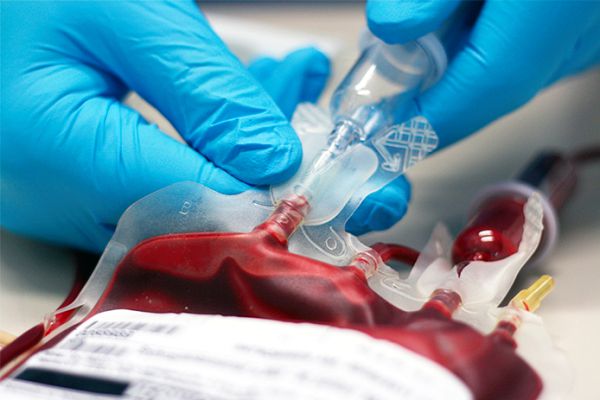
Achieving self-sufficiency in safe blood and blood products in Ghana
The right to good healthcare is a constitutional imperative in Ghana.
This includes the right of patients to safe blood for transfusion in cases such as surgery, severe anaemia, obstetric emergencies and management of haematologic disorders.
Advertisement
Adequate and safe blood supply, according to the World Health Organisation (WHO), is best achieved through regular voluntary blood donation by at least one per cent of a population.
That is, the minimum national blood requirement is 10 units per 1000 per population. This measures the adequacy of blood supply.
According to the National Blood Service (NBS), Ghana’s blood collection index per 1,000 population (BCI/1000 population) in 2018 was 7.0 units.
This means seven persons out of every 1000 population donated blood which is below the WHO recommended minimum BCI/1000 population.
The low BCI/1000 population in Ghana is largely attributable to low voluntary blood donation which stood at about 37 per cent of all blood donations nationwide in 2018.
Blood transfusion is a necessary medical intervention that saves lives or improves the quality of life of millions of patients.
Hence, adequate supplies of safe blood and blood products that are accessible to patients in need remain top on the agenda of international bodies such as the WHO, the International Society for Blood Transfusion (ISBT) and the African Society for Blood Transfusion (AfSBT).
Generally, there are three main sources of blood supply – voluntary donors, family/replacement donors and paid (or commercial) donors.
Various studies, including data from the NBS show conclusively that voluntary donors present the lowest prevalence of markers of transfusion transmissible infections (TTIs) namely HIV, Hepatitis B, Hepatitis C and Syphilis.
In June 2009, the WHO adopted the Melbourne Declaration which advocated for achieving adequate and safe blood supply through 100 per cent voluntary unpaid blood donation by 2020.
Obviously, Ghana is far from achieving this goal. The national blood supply depends largely on replacement donations.
Lessons
The reports by the NBS give cause for concern.
It is against this background that this writer highlights some lessons from a recent study tour to the Immunohaematology and Transfusion Medicine Service at Imperia Hospital in Liguria, Italy to improve blood services in Ghana.
The study tour was facilitated by Baldi Baldi Onlus, an Italian foundation, as part of capacity building collaboration with the NBS.
Italy, according to the National Institute of Health, achieved self-sufficiency in safe blood was based on voluntary unpaid donation since 2010.
Blood donation is voluntary, anonymous and unpaid.
Access to blood and blood products for transfusion is guaranteed as part of the healthcare package provided for all citizen.
This contrasts sharply with Ghana’s situation where access to adequate and safe blood for transfusion is not guaranteed.
Blood transfusion is not covered under the National Health Insurance Scheme (NHIS), hence patients pay processing fees out-of-pocket.
This is a major disincentive to voluntary blood donors.
The minimum health package covered by the NHIS should ,therefore, be reviewed to include blood transfusion to encourage voluntary blood donation.
This will increase the supply of safe blood and blood products, now classified as essential medicines in Ghana.
Another striking aspect of blood donation in Italy is the right of workers to paid leave to donate blood.
Workers are entitled to take time off work to donate blood once every three months.
This has spurred the country on to attaining self-sufficiency in safe blood.
A similar provision in Ghana will be an incentive to workers to donate blood regularly as a civic duty.
Laws
Further, national blood supply in Italy is entirely regulated by law. European, national and regional laws regulate the collection, testing and processing, storage, distribution and transfusion of blood and blood products.
Blood collected by hospitals and collection centres are sent to regional blood centres for serology and molecular testing.
Thus, blood collection is decentralised to the community level but testing and processing are centralised at regional blood centres.
In Ghana, the NBS Bill, which was first drafted in 2010, is yet to be passed into law.
The National Blood Policy which established the NBS as a semi-autonomous agency of the Ministry of Health (MOH) in 2006 envisaged a transitional period of four years during which the bill was to be passed into law to give the NBS full legal backing to establish and enforce standards for safe blood transfusion in Ghana.
The absence of legislation is inimical to blood safety, adequacy and quality in Ghana.
Consequently, coordination and regulation of blood services in health facilities is weak.
Many health facilities collect and test blood for transfusion without adhering to standards developed by the NBS.
At a recent NBS review meeting in March 2019, participants called for standardising testing for TTI markers across the country to ensure blood safety in health facilities.
While this is a good call, the standards must be backed by legislation for effective enforcement by the NBS and compliance by health facilities.
The government, through the MOH, should hasten the passage of the NBS Bill to accelerate attainment of self-sufficiency in safe blood and blood products based on voluntary unpaid donations in accordance with the Melbourne and Rome Declarations of the WHO.
The writer is Head, Administration and Support Services
National Blood Service.



